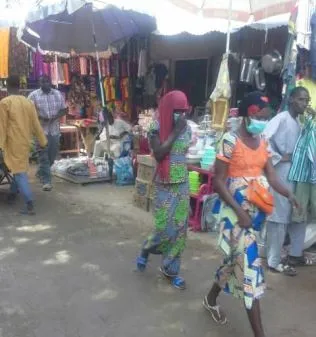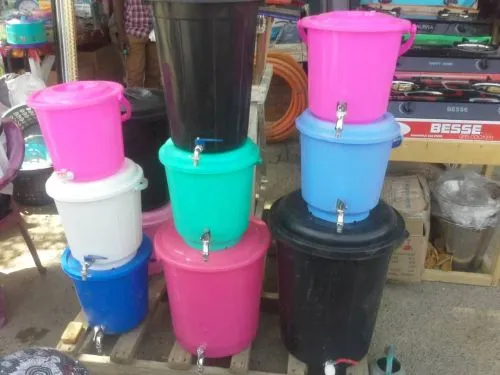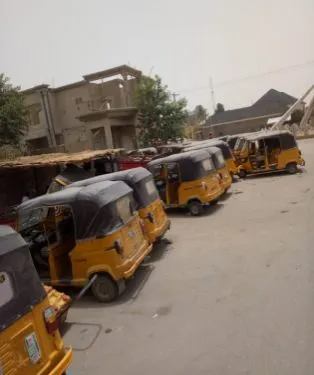Coping with COVID-19 in post-conflict communities.
Part 2: What does a lockdown entail in the Lake Chad Basin region?
Blog post by Oyewole Simon Oginni*)
Lockdown in post-conflict communities of the Lake Chad Basin region
Looking at the impacts of lockdown in the communities on the edge of recovery from conflicts, it is worth visiting the Lake Chad Basin region. This region has been suffering from violent conflicts with the Armed Opposition Groups for more than a decade. Boko Haram and the Islamic State of West Africa Province (ISWAP) have claimed about 27,000 lives and displaced over 2.7 million people in the Lake Chad Basin region. The region comprises four countries: Chad, Cameroon, Niger, and Nigeria. According to the United Nations Population Fund (2017), the Lake Chad Basin was initially a source of livelihood for about 30 million people in these four countries, but it has shrunk to 10% of its original size, due to drought and human-induced factors. This has forced many people living around Lake Chad to migrate to the urban centers at the borderlines of the region.

Displaced people in the cities of Mubi (Nigeria) and Maroua (Cameroon)
Among the frontline cities hosting the largest groups of displaced people are Mubi and Maroua. Mubi is the commercial center of Adamawa in the Northeast of Nigeria. It holds the largest cattle market serving the entire Lake Chad Basin region and bringing together traders and herders from as far as Sudan and Ethiopia. Maroua, on the other hand, is the political and administrative capital of the Far North Region of Cameroon. Maroua connects all the neighboring communities to the Lake Chad Basin region. While Mubi has been occupied by the Armed Opposition Groups for about three months, Maroua has never been occupied by the terrorists, but witnessed onslaughts within the same period. Nevertheless, both urban centers are characterized by a large number of refugees, internally displaced persons and returnees, who are still struggling to rise to their feet after a long period of social and physical dislocations. Other stresses associated with the urban centers are underemployment, unemployment, widespread poverty, weak public health systems and weak democratic institutions. The Lake Chad Stabilization Strategy (2018-2023) was developed in response to the challenges faced by the region.

(Photo credit: Indira Banga (Research Assistant))
Mubi and Maroua: Separated interconnectedness
In the wake of the Covid-19 outbreak, Mubi and Maroua are among the urban centers in which a partial lockdown has been imposed. Police have been deployed to enforce the restriction on mobility and non-essential business activities whilst military and customs personnel staff the porous borders connecting the two urban centers. Mubi depends on Maroua and its surroundings for agricultural products such as beans, millets, sorghum for export into the major cities while Maroua depends on the processed products shipped from Lagos and other commercial centers in Nigeria through Mubi. As the borders between the two cities remain closed, business activities, particularly the cattle market in Mubi have slowed down. A few cattle lorries only are seen moving in and out of the cities as compared to the usual several hundred recorded daily in the past months. People cannot visit their families across the borders and displaced families observe a stay-home-order. On the other hand, Maroua enforced a partial lockdown only from 6pm to 7am. People still visit the marketplace, even though they are aware of the risks of infection. “Lockdown is for the privileged, if you do not have anything to eat at home, you are forced to go out, even if the government says you should not. I am aware it is a risk”, said one the young traders in Mubi North Local Government Area.
Impacts of the lockdown on the recovery and resilience of post-conflict communities
Mubi and Maroua host a large population of internally displaced persons and returnees who live in the slums; only few live with their extended families in the urban centers. Tricycle called “Keke Napep” and motorcycles are the most attractive business to most internally displaced persons and returnees who have no initial capital. They often switch to farming during the planting season to complement their earnings. In Mubi, tricycle is the most popular means of transport since the use of motorcycles has been banned because the Armed Opposition Groups used it a lot. Whereas the new Keke Napep (tricycle) are usually assembled by the host communities, mostly returnees and internally displaced persons are hired to drive the Napep for a daily fee. Thanks to this daily pay, they can cater for their families and send their children to schools. The same applies to Maroua (Cameroon) where the returnees and internally displaced persons ride motorcycles for a daily fee.
Lessons of the Covid-19 response in post-conflict communities
Unlike the major cities, which have enough connections to the rest of the world due to better infrastructure and public services, the Covid-19 response of post-conflict communities in the Lake Chad Basin region has revealed their vulnerability. There is a need for a preliminary mapping of the vulnerabilities and risks as well as the key enablers of livelihood recovery. Thus, gaps can be identified and specific stimulus packages developed that cushion the effects of the lockdown (if need arises) and facilitate easy compliance with the governments’ guidelines in the hard-to-reach communities. This is particularly important for the frontline (border) cities like Mubi and Maroua, which depend so much on cross-border connections for their development and livelihoods. In addition, they face challenges posed by adverse climate change and the shrinking of the Lake Chad Basin. Instead of promoting an isolated policy response, the regional governments around the Lake Chad Basin can work closely on a comprehensive policy to enhance the preparedness and responsiveness to pandemics such as Covid-19. The Lake Chad Basin Regional Stabilization Strategy (2018-2020), which details how the four countries should actively work together in areas of common interest to ensure full recovery, should be subjected to a regular review to better respond to the changing needs of this particular region.
The consequences of restricted mobility
During the first two weeks of full lockdown in Mubi, movements were restricted and all Keke Napeps were grounded. The hope of recovering from the loss of livelihoods due to the insurgency of Boko Haram in the previous years disappeared as the internally displaced and returnees as well as the host communities giving out the tricycles had to stay at home. The effect was that the price of transport rose from N50 (0.12 euros) to N100 (0.25 euros) in Mubi. In Maroua, the number of passengers permitted to be carried on a motorcycle have been restricted to one person. This has also led to an increase in the price of transport (usually around 50 CFA to 100CFA is paid for a drop from Maroua I to Maroua II). Even though the lockdown has directly impacted all the residents in the two border cities, which are also the cities with the highest inflation in both countries, the returnees and internally displaced are the most affected. They have less social capital for alternative livelihoods to rely on, and social distancing makes it risky to visit family members for support, if there is any at all.
Lessons of the Covid-19 response in post-conflict communities
Unlike the major cities, which have enough connections to the rest of the world due to better infrastructure and public services, the Covid-19 response of post-conflict communities in the Lake Chad Basin region has revealed their vulnerability. There is a need for a preliminary mapping of the vulnerabilities and risks as well as the key enablers of livelihood recovery. Thus, gaps can be identified and specific stimulus packages developed that cushion the effects of the lockdown (if need arises) and facilitate easy compliance with the governments’ guidelines in the hard-to-reach communities. This is particularly important for the frontline (border) cities like Mubi and Maroua, which depend so much on cross-border connections for their development and livelihoods.

In addition, they face challenges posed by adverse climate change and the shrinking of the Lake Chad Basin. Instead of promoting an isolated policy response, the regional governments around the Lake Chad Basin can work closely on a comprehensive policy to enhance the preparedness and responsiveness to pandemics such as Covid-19. The Lake Chad Basin Regional Stabilization Strategy (2018-2020), which details how the four countries should actively work together in areas of common interest to ensure full recovery, should be subjected to a regular review to better respond to the changing needs of this particular region.
*) About the author:
Oyewole S. Oginni is a Junior Researcher at the Center for Development Research, University of Bonn. He just completed his doctoral fieldwork in Maroua (Cameroon) and Mubi (Nigeria), where he focused on security-humanitarian-development nexus in post-conflict cities.
» Also read: COVID-19’s impact on West Africa’s vulnerable communities


